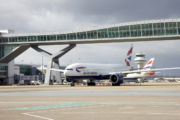-
In 2017 (within the 6 year window) a BA flight from PHX to LHR that I was on arrived over 4 hours late. The reason given was that the inbound flight had to be diverted due to a medical issue.
Someone on here mentioned that this does not count as an extraordinary circumstance to deny compensation but I can’t locate the post. All that I can see on the internet is a legal blog post that confirms this and I also can’t find anything from searching Google for the ruling.
BA are playing hardball. Initially they denied I was on the flight and then said the reason for the delay was an emergency landing on the actual flight I was on. Eventually they acknowledged that it was due an incident on an earlier flight in the plane schedule that caused the delay but are adamant that no EU261 is due, final answer. Anyone know if this is correct?
I wouldn’t normally wish to make financial gain from such a situation but BA stung me for a fortune for this one-way flight at short notice due to a family situation. Also as a missed my prebooked train from London I was another £110 out of pocket by having to pay for another train ticket.
The problem you might face is that you won’t have enough evidence to support your case at MCOL because it’s been such a long time.
Did you collect evidence at that time? For example, recording of the captain and other announcements, etc. This will greatly increase your chances of success.
You don’t say when it occurred in 2017, but you do need to submit the claim before the six year expiry and follow procedure – letter before action, giving them at least a week or two to respond before submitting the claim to MCOL.
I also wouldn’t go to CEDR with this simply because it might get to arbitrator after six years have passed and CEDR don’t have to follow all the rules. Then you’ve lost your chance to go to MCOL as well.
“I wouldn’t normally wish to make financial gain from such a situation” – don’t sweat it, HfP forum is infamously the home of miscreants always on the lookout for this.
You’re asking whether anyone on here can support your view that 261 compo is applicable in this circumstance. But is that really a useful question? bA have said no it does not apply “final answer” as you note above. So the better question may be what route you should now pursue to have a judicial/quasi-judicial decision on your case. I’ve not yet had to pursue BA on denied 261 compo so can’t advise personally on each route’s merits. Others will be able to direct you to previous threads on this matter though.
Surely a medical emergency would be classed as “extraordinary”, in respect of compensation, as opposed to pilot/crew sickness? A diversion would suggest the former.
Have you researched Lipton v BA Cityflyer?
That related to a pilot becoming ill off duty? So not an in-flight medical emergency, as far as I can see.
@NorthernLass and @Karl the medical emergency is an extraordinary circumstance for the flight on which it happened. The extraordinary circumstances don’t extend to the return flight. This is exactly the circumstances that happened to my mum last October, she was delayed on a Virgin flight from MIA to LHR due to plane from LHR being diverted due to medical emergency and all credit to Virgin they paid EC261 compensation without quibble.
BA has failed in doing everything it can to minimise the delay to passengers on the subsequent flight – they could have rerouted affected passengers onto alternative carriers.
@Karl, your problem is how to proceed since BA has refused your claim. If you are absolutely certain of your case, I’d suggest MCOL, although I’d rate your chances as very low success given the time delay in pursuing the case. That said, your case is strengthened by BA admitting that the delay was caused by an incident on an earlier flight.BA has failed in doing everything it can to minimise the delay to passengers on the subsequent flight – they could have rerouted affected passengers onto alternative carriers.
You can’t say that with any certainty.
You don’t know what alternative flights and reroutes were available or even if they would have gotten the passengers back to LHR any quicker.
Sometimes sticking with the delayed flight is the best and only option.
BA are in a bind here. The diversion wasn’t their fault and it was a flight to an outstation. If this delay was on a flight to LHR they have far more scope to swap a plane over so other flights don’t have long delays.
EU261 rights don’t care if it is an outstation or not though. If they don’t want to pay compensation, airlines are to have all facilities, including spare aircraft and crew, in all outstations.
The problem you might face is that you won’t have enough evidence to support your case at MCOL because it’s been such a long time.
Surely if BA already told the OP the reason for the delay, that is evidence enough?
It isn’t clear when you actually raised this with BA and they sent a final decision letter – CEDR can only consider a case within 12 months of that letter. While the statute of limitations may permit a MCOL case to be brought within six years, some explanation as to why you have waited so long will be required. The final para of your post is somewhat contradictory and any statement to the court will be covered by a Statement of Truth so you need to be careful. Overall it doesn’t feel like a case that will receive a very sympathetic hearing.
It is incorrect to suggest that ‘extraordinary circumstances’ affecting an inbound flight can’t carry over to the next flight; it depends on the specific situation and BA’s efforts to avoid/reduce a delay which they will have documented. The BA Cityflyer judgment was a very specifically argued case re illness and has no relevance to this one.
EU261 rights don’t care if it is an outstation or not though. If they don’t want to pay compensation, airlines are to have all facilities, including spare aircraft and crew, in all outstations.
That is simply incorrect. UK/EC261, like most legal issues, considers reasonableness and what you suggest patently is not. They need to take steps to mitigate the delay, but it doesn’t extend to your suggestion.
In respect of your second post, BA is relying on the ‘extraordinary circumstances’ relating to the inbound flight which they are entitled to do and it’s up to the passenger to demonstrate that this defence is not valid, something they are likely to struggle with.
@JDB there are specific judgements regarding this and you are not correct. These cases have amended the EU261 as such and clearly state late arriving aircraft due to disruption on an earlier flight is not extraordinary unless it’s a widespread worldwide/region-wide disruption like volcanic ash. There is no reasonableness argument in this case.
No need to demonstrate why you waited as here we only have the issue of compensation and not a re-route or ticket validity argument. You’re confusing things.
The strength of OPs MCOL case will only depend on the evidence they have on the actual reason for cancellation. BA can claim any number of reasons for the delay and without proper evidence it won’t go well.
But meta, I don’t think the OP wants the argue that was not the reason for the delay. Simply that this reason does not constitute an extraordinary circumstance.
It was June 2017 so just within the time limit (it’s taken 10 weeks of emails to BA to get a final rejection).
Evidence would definitely be an issue about taking it further. All I have to show that I was on the flight was a confirmation email and no other details of the delay noted.
BA record keeping doesn’t seem to be great either. It took about three emails before they got the correct reason for the delay (a passeneger falling ill earlier the previous day of the plane’s schedule). I was hoping to get them on this not constituting an exceptional circumstance.
Funnily enough my parents has the same thing happen to them when flying from TFS to LPL before Christmas. Flight delayed by 5 hours due to inbound plane having to drop off a passenger in Portugal on the way. Ryanair paid out full EU261 within 72 hours of receiving their claim.
I’ll probably leave it now. Despite being out of pocket from the delay I do feel slightly uneasy about financially benefitting from someone’s ill health. Thanks for the replies.
BA has failed in doing everything it can to minimise the delay to passengers on the subsequent flight – they could have rerouted affected passengers onto alternative carriers.
… it was a flight to an outstation. If this delay was on a flight to LHR they have far more scope to swap a plane over so other flights don’t have long delays.
Good point @BAFIG. However so far as I’m aware the view of EU261 was that airlines are supposed to have contingency arrangements and be prepared to offer them, eg spare crew or equipment options, or rerouting including on other airlines if necessary, and no distinction was made about outstations.
It does seem a little harsh on airlines to me too especially where the contingency arrangements are needed at an outstation but there’s nothing that makes concessions in EU261 for this so I assume it was intentionally written like that. Given the abuses airlines perpetrated that caused EU261 to be enacted, and the rampant abuses that still continue in flagrant breach of it, this kinda seems fair enough.
@JDB may say case law in the UK has made more allowances and he does have better access to case records but I haven’t spotted anything reported publicly that makes me think a claim isn’t worth your weighing up whether the MCOL fee to give it a go is worth paying.BA has failed in doing everything it can to minimise the delay to passengers on the subsequent flight – they could have rerouted affected passengers onto alternative carriers.
You can’t say that with any certainty.
You don’t know what alternative flights and reroutes were available or even if they would have gotten the passengers back to LHR any quicker.
Sometimes sticking with the delayed flight is the best and only option.
BA are in a bind here. The diversion wasn’t their fault and it was a flight to an outstation. If this delay was on a flight to LHR they have far more scope to swap a plane over so other flights don’t have long delays.
PHX is not a small airport. There are dozens of other flights from there, both AA and other alliances. BA could have offered the option of flying from PHX to another US gateway and then back to the UK in order to minimise the delay. Whether any of those options would be preferable to just waiting for the inbound flight is for the passenger to decide. It is not up to BA to make that decision for passengers. If BA doesn’t do anything that fails the “did everything to mitigate the delay for passengers” test. BA probably thought it could make up time on the flight back to LHR. That return flight which Karl was on was under BA’s control.
@NorthernLass and @Karl the medical emergency is an extraordinary circumstance for the flight on which it happened. The extraordinary circumstances don’t extend to the return flight. This is exactly the circumstances that happened to my mum last October, she was delayed on a Virgin flight from MIA to LHR due to plane from LHR being diverted due to medical emergency and all credit to Virgin they paid EC261 compensation without quibble.
BA has failed in doing everything it can to minimise the delay to passengers on the subsequent flight – they could have rerouted affected passengers onto alternative carriers.
@Karl, your problem is how to proceed since BA has refused your claim. If you are absolutely certain of your case, I’d suggest MCOL, although I’d rate your chances as very low success given the time delay in pursuing the case. That said, your case is strengthened by BA admitting that the delay was caused by an incident on an earlier flight.I would second everything @AJA has said.
Btw not that it technically should matter, but if any quesrion is raised about not following this up for 6 years I can well imagine it may have rankled all this time especially with the extra cost it caused you, but if you’ve now received advice from knowledgeae people that you do have a reasonable case and should give it a go, then go for it and make haste to be in a posution to submit the MCOL claim within the 6 years after due Letter Before Action to BA Legal at Waterside by snail mail signed-for leaving, say, a number of days somewhere between 14 and 30 for them to respond, before the date you submit MCOL.
@LadyLondon I’m not sure who has said the OP has a reasonable worth investing time and court fees to pursue. Probably £155 fees to claim €600. It is quite clear that a medical emergency on the inbound flight might very well relieve an airline of its EC261 obligations and it would depend on the precise circumstances and whether in all the circumstances BA took appropriate steps. The idea that BA would need to rebook a whole flight on other airlines for this sort of delay is just so absurd and they could not have been expected to get a relief aircraft to PHX. There’s all this lovely theory fantasy land often from those who have zero knowledge or experience of MCOL, then there is the real world. Here you have the six year delay and BA having a potentially good defence.
PHX is not a small airport. There are dozens of other flights from there, both AA and other alliances. BA could have offered the option of flying from PHX to another US gateway and then back to the UK in order to minimise the delay. Whether any of those options would be preferable to just waiting for the inbound flight is for the passenger to decide. It is not up to BA to make that decision for passengers. If BA doesn’t do anything that fails the “did everything to mitigate the delay for passengers” test. BA probably thought it could make up time on the flight back to LHR. That return flight which Karl was on was under BA’s control.
You say that with such certainty but in reality you have no idea what other – if any – flights were available that day.
SFO is also a large airport and last year when my 10pm AA to JFK was cancelled at 8.30pm there was only one other flight out that would have got me to JFK in time for my onward to LHR.
And there were only 4 empty seats in Business on it and zero in economy. So a busy airport is no guarantee of anything,
But meta, I don’t think the OP wants the argue that was not the reason for the delay. Simply that this reason does not constitute an extraordinary circumstance.
This is what I am talking about. You can see that BA is changing the narrative towards a reason that would constitute an extraordinary circumstance. You need to have good evidence to prove they are wrong.
@LadyLondon I’m not sure who has said the OP has a reasonable worth investing time and court fees to pursue. Probably £155 fees to claim €600. It is quite clear that a medical emergency on the inbound flight might very well relieve an airline of its EC261 obligations and it would depend on the precise circumstances and whether in all the circumstances BA took appropriate steps. The idea that BA would need to rebook a whole flight on other airlines for this sort of delay is just so absurd and they could not have been expected to get a relief aircraft to PHX. There’s all this lovely theory fantasy land often from those who have zero knowledge or experience of MCOL, then there is the real world. Here you have the six year delay and BA having a potentially good defence.
I am talking from my own experience at MCOL regarding this extraordinary circumstance on a late arriving aircraft. Basically BA claimed extraordinary circumstance due to bad weather which had a knock on effect on the arriving flight (we are talking five hours delay). Judge said that’s not extraordinary circumstance and that BA could have brought a new plane or rebooked me on another airline given that it is a short-haul flight and there were plenty of other flights.
Also MCOL fee for 600 euros (or £520) would be £70, not £155!
PHX is not a small airport. There are dozens of other flights from there, both AA and other alliances. BA could have offered the option of flying from PHX to another US gateway and then back to the UK in order to minimise the delay. Whether any of those options would be preferable to just waiting for the inbound flight is for the passenger to decide. It is not up to BA to make that decision for passengers. If BA doesn’t do anything that fails the “did everything to mitigate the delay for passengers” test. BA probably thought it could make up time on the flight back to LHR. That return flight which Karl was on was under BA’s control.
You say that with such certainty but in reality you have no idea what other – if any – flights were available that day.
SFO is also a large airport and last year when my 10pm AA to JFK was cancelled at 8.30pm there was only one other flight out that would have got me to JFK in time for my onward to LHR.
And there were only 4 empty seats in Business on it and zero in economy. So a busy airport is no guarantee of anything,
You’re absolutely correct that I have no idea nor indeed any certainty that any other flights were available that day. However my point is that EC261 does not give the airline a getout on paying compensation because an inbound plane has an extraordinary circumstance. The test is did BA do everything it could have to reduce the 4 hour delay on the actual flight? That question includes putting passengers on other airlines, potentially re-routing passengers via other airports, flying home quicker (using more fuel) etc – there is no list of actions, just a question of did BA do EVERYTHING it could have to minimise the delay or did it not? It looks like BA has tried to do its usual trick of obfuscation and refusal rather than admit that the passenger is due compensation.
In your circumstance you weren’t covered by EC261 anyway as your flight was operated by AA and it was not on a flight to the EC or the UK. However if EC261 had applied you could have asked to be rerouted on the other plane that could have got you to JFK in time for your flight to the UK. That is your right. The airline can’t ignore the option AND refuse to pay compensation. It is up to you what you choose to do in the circumstances applicable at the time.
The whole point of this thread is that BA seems to be refusing to pay compensation because it is wrongly claiming that the medical emergency on the outbound flight was extraordinary circumstances and that those extraordinary circumstances applied to the actual delayed flight in question.
There is one further point to add which is that we are judging BA on what we know applies today, in other words using retrospect to make a claim. I don’t know whether you can successfully use today’s knowledge to claim for a flight 6 years ago and having only recently claimed which is why I suggested that there is a slim chance of success at MCOL.
But meta, I don’t think the OP wants the argue that was not the reason for the delay. Simply that this reason does not constitute an extraordinary circumstance.
This is what I am talking about. You can see that BA is changing the narrative towards a reason that would constitute an extraordinary circumstance. You need to have good evidence to prove they are wrong.
What? The whole reason is saying that a medical emergency on an inbound flight is not an extraordinary circumstance. That is what the OP wants to prove. The OP is not trying to prove that was not the reason.
@meta it’s £70 + £85 hearing fee = £155 and this case will surely go to a hearing. Where I am afraid you systematically go wrong is that you suggest someone will win because you allegedly won a case with similar but clearly not identical facts and as it is anyway a subjective decision, the sabe facts could result in a different decision. There are no binding judgments that cover the circumstances of this case so it will be considered on its facts and the law as it applied at the time (ie in 2017), not today. I don’t believe for one moment you would take this case to MCOL today.
- You must be logged in to reply to this topic.
Popular articles this week:



















